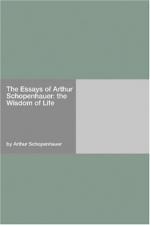|
This section contains 3,545 words (approx. 12 pages at 300 words per page) |

|
SOURCE: "Arthur Schopenhauer as a Critic of History," in Journal of the History of Ideas, Vol. XXXVI, No. 2, April-June 1975, pp. 331-38.
In the following essay, Gottfried examines Schopenhauer 's philosophy of history, contrasting it with that of Hegel and the Judeo-Christian tradition.
During the second half of the nineteenth century, educated Europeans, particularly Germans, respected Schopenhauer primarily as a formal philosopher and stylist. His most enthusiastic readers also knew that he was interested in history, and his most fervent admirers defended his views on this subject. György Lukács, the Marxist scholar, with much justification, speaks of him as "the intellectual leader of the German bourgeoisie" in the generation following 1848. The spoiled revolutions of that year supposedly destroyed the idealism of many liberal reformers. At the same time, those capitalists who feared the possibility of a proletariat uprising, searched for antisocial ideologies. Both groups rejected the Hegelianism...
|
This section contains 3,545 words (approx. 12 pages at 300 words per page) |

|


